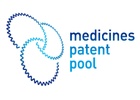Medicines Patent Pool
By
Medicines Patent Pool
Published: Oct. 5, 2016, 6:27 p.m.·
Tags:
Access
Medicines Patent Pool's signature database upgraded to include patent and licensing data for HIV, hepatitis C and TB medicines.
Read More →
By
Medicines Patent Pool
Published: Nov. 6, 2015, 9:19 p.m.·
Tags:
Access
TB is the leading cause of death for people living with HIV and killed 1.5 million people globally in 2014 alone. TB treatment has become more complex, particularly with the emergence of multidrug-resistant strains of TB. The Medicines Patent Pool, the world’s only voluntary licensing mechanism in public health, will now work to ensure access to new treatments for drug-resistant and drug-susceptible TB.
Read More →
By
Medicines Patent Pool
Published: July 6, 2015, 8:35 p.m.·
Tags:
Access,
Hepatitis C
As part of its ongoing consultation processes on the possibility of the Medicines Patent Pool (MPP) expanding into other disease areas, the organisation has published independent feasibility studies exploring the case for potential entry into hepatitis C and tuberculosis.
Read More →
By
Medicines Patent Pool
Published: May 8, 2015, 8:31 p.m.·
Tags:
Access
The MPP acknowledges the recent response and input from various civil society organisations and treatment groups on the Foundation’s ongoing assessments to determine the feasibility of extending its mandate to include medicines for hepatitis C (HCV) and tuberculosis (TB).
Read More →
By
Medicines Patent Pool
Published: Oct. 4, 2014, 10:06 p.m.·
Tags:
Advocacy
The Medicines Patent Pool (MPP) is seeking proposals from individuals and organisations to assess the feasibility of expanding the mandate of the MPP into tuberculosis (TB). The proposed timeframe for the provision of the consultancy services is 15th November 2014 to 27th February 2015.
Read More →
By
Medicines Patent Pool
Published: April 17, 2012, 9:40 p.m.·
Tags:
None
An analysis by think tank Results for Development concluded that the Medicines Patent Pool as established by UNITAID could speed up development of fixed-dose combination pills, paediatric medicines and heat stable formulations needed in resource-poor settings, as well as help stimulate generic manufacture of lower cost medicines. And that it will need a critical mass of companies to participate in order to succeed.
Read More →
Page 2 of 2 · Total posts: 6
←First
1
2
